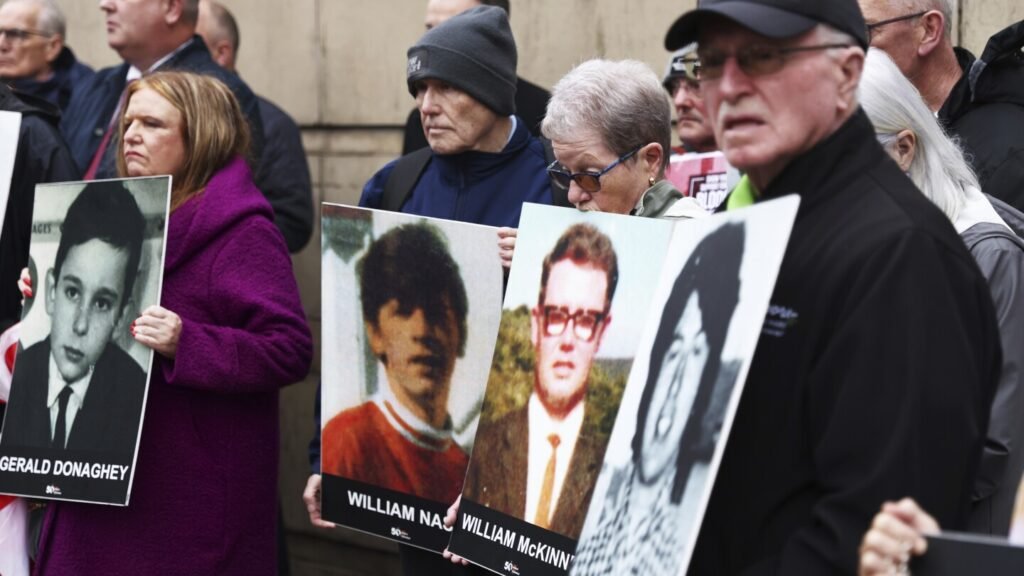Soldier F on Trial: The Fallout of Bloody Sunday
Introduction to the Trial
The trial of the only British soldier prosecuted in connection with the 1972 Bloody Sunday massacre commenced in Belfast. This case represents a pivotal moment in Northern Ireland’s turbulent history during a period marked by intense sectarian conflict known as “The Troubles.”
The former paratrooper, known only as “Soldier F” to protect his identity, faces serious charges, including murder and attempted murder. His trial is being closely observed, with families of victims from that infamous day present, seeking justice for their loved ones.
Historical Context: A Legacy of Violence
On January 30, 1972, unarmed civil rights demonstrators were confronted by British soldiers in Londonderry, which resulted in the deaths of 13 individuals and injuries to 15 more. Prosecutor Louis Mably asserted in court that the civilians posed no credible threat, as they were unarmed and running for safety when they were shot.
The events that unfolded that day have since been recognized as part of a broader narrative of sectarian violence that engulfed Northern Ireland for decades. Despite the Good Friday Agreement in 1998, which sought to establish a framework for peace and shared governance in Northern Ireland, many families continue to seek acknowledgment and accountability for the past atrocities committed during the conflict.
The Long Journey to Justice
The road to this trial has been anything but straightforward. Families of the victims have campaigned tirelessly for over fifty years, culminating in a march to the courthouse carrying the names and photographs of their loved ones, under the banner "Towards Justice."
John McKinney, whose brother was among the slain, marked this momentous occasion as a significant victory in their long battle for accountability. He expressed, “We have battled all the odds to get here,” emphasizing the relentless determination requisite to bring the case to court.
A Complicated Legal Journey
The complexity of the legal proceedings surrounding the Bloody Sunday massacre is evident in its convoluted history. Initially, a 1972 inquiry cleared soldiers of wrongdoing, citing self-defense. However, scrutiny increased after a 2010 review revealed that soldiers had fired on fleeing civilians, leading then-Prime Minister David Cameron to issue an apology for the "unjustified" killings.
Despite initial investigations targeting multiple individuals, only Soldier F was charged. Prosecutors determined that there wasn’t enough evidence against 16 other former soldiers and two alleged members of the Irish Republican Army involved in the Sunday shooting.
Challenges Ahead for the Prosecution
As the trial progresses, hurdles remain. Prosecutors must navigate complex legal challenges, including the admissibility of evidence and the use of hearsay testimony, which could complicate the path to conviction.
Mably indicated that while the prosecution can’t pinpoint who shot which victim, they believe there is collective responsibility among the soldiers. The chaotic scene during the shooting, as described, underscores the utter confusion and ensuing tragedy of that fateful day.
Survivor Testimonies and Community Response
Survivor testimonies are anticipated to play a critical role in the trial, with three survivors expected to recount their harrowing experiences during the violence. Outside the courthouse, family members have gathered in solidarity for the victims, while some military veterans have also shown up to express their support for Soldier F.
David Johnstone, Northern Ireland’s Veterans Commissioner, emphasized the need for a fair portrayal of the armed forces and their service during this tumultuous time. He asserted that the majority of soldiers served with dignity and highlighted the ongoing frustrations felt by veterans regarding how historical narratives have been shaped since the 1998 peace accord.
Conclusion: The Fight for Justice Continues
As the trial of Soldier F unfolds in Belfast, the familial quest for justice continues to resonate deeply within the community. This landmark case not only revisits the dark chapters of The Troubles but also serves as a crucial moment in Northern Ireland’s ongoing struggle to confront its past. The outcome of this trial could have lasting implications for both justice and reconciliation in a region still navigating the echoes of its violent history.
This story remains a poignant reminder of the need for justice and closure, a sentiment echoed through the generations seeking answers and recognition for the lives lost in the conflict. The trial resumes with significant implications for those involved and the broader Northern Irish society.


